Conjunctivitis, often called “pink eye,” is a common and typically harmless eye infection that can cause discomfort and anxiety. While its characteristic redness and irritation might seem scary, understanding the causes, symptoms, and treatment options can help you navigate this temporary eye trouble with ease.
What is conjunctivitis?
Conjunctivitis is an inflammation of the conjunctiva, a thin membrane lining the white of your eye and the inner surface of your eyelids. This inflammation can be caused by various factors, leading to different types of conjunctivitis with distinct causes and symptoms.
Types of Conjunctivitis:

- Viral conjunctivitis: The most common type, highly contagious and often linked to colds or other respiratory infections.
- Bacterial conjunctivitis: Less contagious than viral but can cause thicker discharge and crusting around the eyes.
- Allergic conjunctivitis: Triggered by allergens like pollen, dust, or pet dander, causing itchy, watery eyes.
- Giant papillary conjunctivitis: Often associated with contact lens wear, causing irritation and bumps on the inner eyelids.
Symptoms of Conjunctivitis
the symptoms of conjunctivitis and their typical timeline:
| Symptom | Timeline |
|---|---|
| Redness of the eyes | Present throughout the course of conjunctivitis |
| Itchiness or irritation | Present from the onset and may persist |
| Excessive tearing | May occur at the beginning and persist |
| Discharge from the eyes | Typically present, may vary in consistency |
| Crusting of eyelids | More common in the morning, may persist |
| Sensitivity to light | May develop, especially in cases of viral conjunctivitis |
- Redness of the white of the eye (the sclera)
- Watery or discharge from one or both eyes
- Itching and burning sensation
- Gritty feeling in the eyes
- Sensitivity to light in some cases
Treatment Options:
The type of conjunctivitis determines the appropriate treatment. Here’s a general overview:
- Viral conjunctivitis: Usually resolves on its own within 7-10 days. Practice good hygiene to avoid spreading the infection.
- Bacterial conjunctivitis: Requires antibiotic eye drops or ointments prescribed by your doctor.
- Allergic conjunctivitis: Antihistamine eye drops or oral medications can help manage symptoms.
- Giant papillary conjunctivitis: Proper contact lens hygiene, switching lens material, or even discontinuing contact lens wear might be recommended.
Home Remedies:

While not a substitute for professional treatment, these home remedies can offer some comfort:
- Warm compresses on closed eyelids several times a day
- Artificial tears to soothe dryness
- Cool chamomile tea compresses (after cooling)
- Avoiding makeup and contact lenses until the infection clears
Remember: Seek medical attention if your symptoms worsen, persist for more than two weeks, or involve severe pain, vision changes, or a weakened immune system.
Living with Pink Eye:
Conjunctivitis, while uncomfortable, is typically temporary and rarely causes long-term complications. By understanding the different types, symptoms, and treatment options, you can manage this common eye issue effectively and get back to enjoying clear, healthy vision.
FAQs
What is the best treatment for conjunctivitis?
The treatment for conjunctivitis, also known as pink eye, depends on the cause. For bacterial conjunctivitis, doctors typically prescribe antibiotic eye drops or ointments to clear the infection. For viral conjunctivitis, which is more common, treatment focuses on symptom relief. This may include using cold compresses, artificial tears, and over-the-counter antihistamine eye drops to alleviate discomfort and reduce inflammation.
What is the main cause of conjunctivitis?
Conjunctivitis can have various causes, including viral infections (such as adenovirus), bacterial infections (such as Staphylococcus or Streptococcus), and allergic reactions to irritants like pollen, dust, or pet dander. Additionally, conjunctivitis can result from exposure to irritants such as smoke, chemicals, or contact lenses.
How do you cure conjunctivitis fast?
While there is no specific cure for conjunctivitis, several measures can help alleviate symptoms and promote faster recovery.
These include:
- Practicing good hygiene, such as washing your hands frequently and avoiding touching your eyes.
- Applying warm or cold compresses to the affected eye to reduce inflammation and soothe discomfort.
- Using over-the-counter artificial tears or lubricating eye drops to keep the eyes moist and comfortable.
- Avoiding wearing contact lenses until the infection clears, as they can exacerbate symptoms and prolong recovery.
- Following any treatment regimen prescribed by your healthcare provider, such as antibiotic eye drops for bacterial conjunctivitis.
Can I go to work with conjunctivitis?
It is generally advisable to stay home from work or school if you have contagious conjunctivitis, especially if it is caused by a bacterial or viral infection. This helps prevent the spread of the infection to others. Most healthcare providers recommend staying home until the symptoms improve and you are no longer contagious, which typically takes a few days to a week, depending on the cause of conjunctivitis and the effectiveness of treatment.
Additional Resources:
- Centers for Disease Control and Prevention (CDC): https://www.cdc.gov/conjunctivitis/index.html
- American Academy of Ophthalmology (AAO): https://www.aao.org/eye-health





